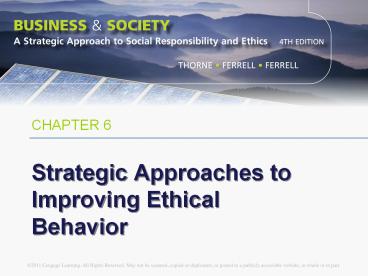Strategic Approaches to Improving Ethical Behavior - PowerPoint PPT Presentation
Title:
Strategic Approaches to Improving Ethical Behavior
Description:
CHAPTER 6 Strategic Approaches to Improving Ethical Behavior Chapter Objectives To provide an overview of the need for an organizational ethics program To consider ... – PowerPoint PPT presentation
Number of Views:2770
Avg rating:3.0/5.0
Title: Strategic Approaches to Improving Ethical Behavior
1
CHAPTER 6
- Strategic Approaches to Improving Ethical Behavior
2
Chapter Objectives
- To provide an overview of the need for an
organizational ethics program - To consider crucial keys to development of an
effective ethics program - To examine effective implementation of an ethics
program
3
The Need forOrganizational Ethics Programs
- Organizations are held accountable for the
conduct of their employees. - Organizations can create unethical corporate
cultures. - Stakeholders demand greater ethical andsocial
responsibility.
4
Codes of Conduct
- Formal statements that describe what an
organization expects of its employees
5
Developing andImplementing a Code of Ethics
- Consider areas of risk and state values as well
as necessary conduct. - Identify values that specifically address
currentethical issues. - Consider values that link the organization to a
stakeholder orientation. - Make the code understandable by
providingexamples that reflect values. - Communicate the code frequently in language
employees can understand. - Revise the code each year.
6
Ethics Officers
- Assess organizational needs and risks
- Develop and distribute the code of ethics
- Conduct ethics training programs
- Establish and maintain a confidential system to
respond to ethics questions - Make certain the company is in compliance with
government regulation - Monitor and audit ethics conduct
- Take action when there is a code violation
- Review and update the code
7
Ethics Training and Communication
- Educates employees about the firms policies,
expectations, relevant laws and regulations, and
general social standards - Makes employees aware of available resources,
support systems, and personnel who can assist
with ethics and legal advice - Can empower employees
8
Training andCommunication Initiatives
- Should reflect the unique characteristics of an
organization - Must operate with a strong foundation
- Are more effective if employees engagein
exercises that involve solving ethical dilemmas
that relate to their job
9
Establishing Systems to Monitorand Enforce
Ethical Standards
- Help or assistance lines
- Observation and feedback
- Whistle-blowing
10
Questions to Ask BeforeEngaging in External
Whistle-blowing
- Have I exhausted internal anonymous reporting
opportunities within the organization? - Have I examined company policies and codes that
outline acceptable behavior and violations of
standards? - Is this a personal issue that should be resolved
through other means? - Can I manage the stress that may evolve from
exposing potential wrongdoing in the
organization? - Can I deal with the consequences of resolving an
ethical or legal conflict within the organization?
11
Continuous Improvementof the Ethics Program
- Putting strategies into action
- Translating a plan of action into operational
terms and monitoring, controlling, and improving
organizational performance
12
ImplementingOrganizational Ethics Programs
- Role of leadership
- Transformational leaders
- Transactional leaders
13
Leaders influence Corporate Culture
- Organizational leaders use their power and
influence to shape corporate culture. Power
refers to the influence that leaders have over
the behavior and decisions of subordinates.
14
Five Power Bases
- Reward power
- Coercive power
- Legitimate power
- Expert power
- Referent power
15
Variation in Employee Conduct
- Because people are culturally diverse and have
different values, they interpret situations
differently and will vary in the ethical
decisions they make on the same ethical issue.































